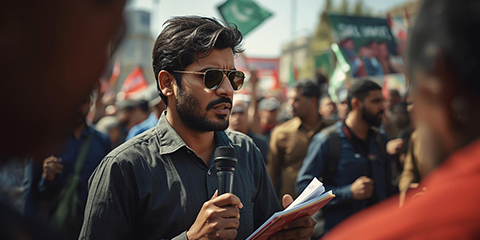When seeing isn't believing: Pakistan's battle with synthetic media
JournalismPakistan.com | Published: 22 February 2025 | JP Special Report
Join our WhatsApp channel
This article explores the challenges Pakistani journalists face in verifying synthetic media created by AI technologies. It offers strategies and tools for effective verification.Summary
ISLAMABAD—In an era where artificial intelligence can create increasingly convincing fake images, videos, and text, Pakistani journalists face unprecedented challenges in verifying digital content. This comprehensive guide provides practical strategies and tools for media professionals navigating the complex landscape of synthetic media.
Understanding Synthetic Media
The term "synthetic media" encompasses any artificial content created or manipulated using artificial intelligence. From deepfake videos to AI-generated articles, these technologies have become more sophisticated and accessible. For Pakistani journalists, understanding how this content is created is the first step toward detecting it. The most common indicators of synthetic media include inconsistent lighting and shadows, unnatural facial expressions in videos, misaligned text in images, and audio-visual synchronization issues that might not be immediately apparent to the untrained eye.
Essential Verification Tools
Pakistani newsrooms now have access to a range of free and accessible tools for content verification. Platforms like InVID-WeVerify offer a comprehensive analysis of videos and images, while Forensically provides detailed examination of digital artifacts. For text analysis, tools like GPTZero have become instrumental in identifying AI-generated content. These resources, combined with traditional journalism skills, form the backbone of modern verification processes.
Learning from Pakistani Case Studies
In early 2024, a manipulated video of a Pakistani politician circulated widely on social media, presenting a crucial test case for local journalists. The successful debunking process involved analyzing audio inconsistencies, cross-referencing with original footage, and collaborating with international fact-checkers. Similarly, when AI-generated images falsely showed environmental damage at a major industrial site, reporters combined metadata analysis with on-site verification to uncover the truth.
Building an Effective Workflow
The most successful verification approaches combine technical analysis with traditional journalism. This starts with a thorough source assessment, including verifying the original upload context and tracking digital footprints. Technical analysis follows, using multiple verification tools while maintaining systematic documentation. The final layer involves human verification through primary sources, subject matter experts, and eyewitness accounts.
Future-Proofing Pakistani Journalism
As AI technology evolves, Pakistani journalists must adapt their verification strategies. This includes staying updated with new verification tools, building international fact-checking partnerships, and advocating for industry standards. Continuous learning through resources like workshops and courses has become essential for maintaining professional standards.
Training and Development
The path forward requires investment in both technological tools and human expertise. Pakistani media organizations are increasingly partnering with international fact-checking networks and journalism institutions to provide comprehensive training for their staff. These partnerships help ensure that Pakistani journalists remain at the forefront of digital verification techniques.
Looking Ahead
The battle against synthetic media requires vigilance, expertise, and collaboration. As technology continues to advance, Pakistani journalists must maintain a balance between embracing new verification tools and relying on fundamental journalism skills. By adopting comprehensive verification strategies, Pakistani media professionals can continue to serve their audiences while maintaining the highest standards of journalistic integrity.
KEY POINTS:
- Understanding synthetic media and its indicators.
- Essential verification tools available for journalists.
- Case studies highlighting successful debunking processes.
- Importance of combining technical analysis with traditional journalism.
- Future-proofing Pakistani journalism through training and international partnerships.

























